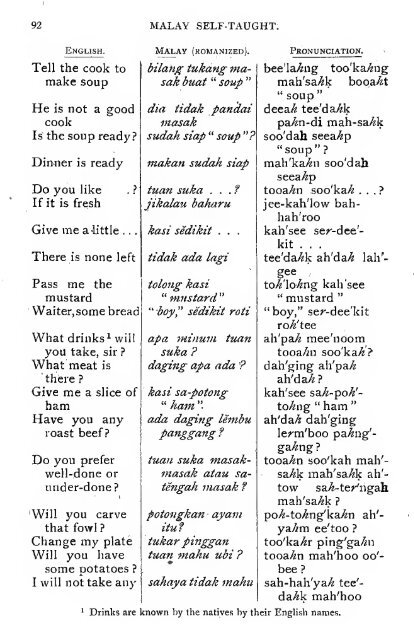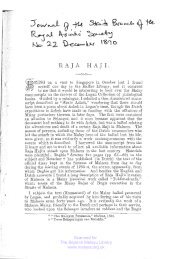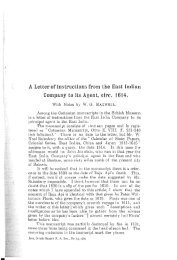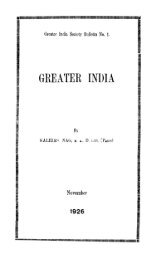Malay self-taught by the natural method : with ... - Sabrizain.org
Malay self-taught by the natural method : with ... - Sabrizain.org
Malay self-taught by the natural method : with ... - Sabrizain.org
You also want an ePaper? Increase the reach of your titles
YUMPU automatically turns print PDFs into web optimized ePapers that Google loves.
92 MALAY SELF-TAUGHT;<br />
English.<br />
Tell <strong>the</strong> cook to<br />
make soup<br />
He is not a good<br />
cook<br />
Is <strong>the</strong> soup ready?<br />
Dinner Is ready<br />
Do you like .<br />
If it is fresh<br />
Give me a little . .<br />
.<br />
?<br />
There is none left<br />
Pass me <strong>the</strong><br />
mustard<br />
Waiter, some bread<br />
What drinks^ will<br />
you take, sir ?<br />
What meat is<br />
<strong>the</strong>re ?<br />
Give me a slice of<br />
ham<br />
Have you any<br />
roast beef?<br />
Do you prefer<br />
well-done or<br />
under-done?<br />
'Will you carve<br />
that fowl ?<br />
Change my plate<br />
Will you have<br />
some potatoes ?<br />
I will not take any<br />
<strong>Malay</strong> (komanizeu).<br />
bilahg tukdng masak<br />
buat " soup "<br />
dia tidak pandai<br />
masak<br />
sudah siap " soup "?<br />
niakan sudah siap<br />
tuan suka .<br />
. .?<br />
jikalau baharu<br />
kasi sedikit . . .<br />
tidak ada lagi<br />
tolong kasi<br />
" mustard "<br />
" boj/," sedikit rati<br />
apa minuvi tuan<br />
suka ?<br />
daging apa ada ?<br />
kasi sa-potong<br />
" ham "<br />
ada daging lembu<br />
panggang ?<br />
tuan suka niasakniasak<br />
atau satSngah<br />
masak ?<br />
potongkan- ayam<br />
iiuf<br />
tukar pinggan<br />
tuan mahu ubi ?<br />
sahaya tidak mahu<br />
Pronunciation.<br />
bee'la/«ng too'ka^ng<br />
mah'saAk boqa^t<br />
" soup "<br />
deea^ tee'da^k<br />
pa^n-di mah-sa^k<br />
soo'dah seeaAp<br />
"soup"?<br />
mah'ka^n soo'dah<br />
seea^p<br />
tooa^^n soo'ka^ . . . ?<br />
jee-kah'low bahhah'roo<br />
kah'see ser-dee'-<br />
kit . . .<br />
tee'da^k ah'da^ lah'gee<br />
,<br />
to^'lo^ng kah'see<br />
" mustard "<br />
" boy," ser-dee'kit<br />
ro^'tee<br />
ah'pa;^ mee'nciom<br />
tooa/m soo'ka^ ?<br />
dah'ging ah'pa^<br />
ah'da/^ ?<br />
kah'see sa^-po;^'tOi^ng<br />
" ham "<br />
ah'da/« dah'ging<br />
lefm'boo pa^ng'ga,^ng<br />
?<br />
tooa^n soo'kah mah'sa^k<br />
mah'sa^k ah'tow<br />
saA-te;^rigah<br />
mah'saAk ?<br />
po^-to/«ng'ka,4n ah'ya/^m<br />
ee'too ?<br />
too'ka^r ping'ga/^n<br />
tooa^n mah'hoo oo'bee<br />
?<br />
sah-hah'ya^ tee'da^k<br />
mah'hoo<br />
Drinks are known <strong>by</strong> <strong>the</strong> natives <strong>by</strong> <strong>the</strong>ir English names.

















